Cell Reproduction -> learned behavior
Learned Behavior
Learned behavior is a type of behavior that an organism develops as a result of experience, practice, and training. It is not inherited genetically but is acquired through interactions with the environment and other individuals. This type of behavior is observed across various species, including humans, animals, and even plants.
Examples of Learned Behaviors
Some examples of learned behaviors include:
- Language acquisition in humans
- Training a dog to perform tricks
- Migration patterns in birds
- Tool use by chimpanzees
- Foraging techniques in various animals
Factors Influencing Learned Behavior
Learned behavior can be influenced by a variety of factors, including:
- Environmental conditions
- Social interactions
- Rewards and punishments
- Imitation of others
- Personal experiences
Study Guide for Learned Behavior
When studying learned behavior, consider the following key points:
- Types of Learned Behavior: Understand the different types of learned behavior, such as classical conditioning, operant conditioning, and observational learning.
- Examples in Nature: Research and analyze examples of learned behavior in various species and how they adapt to their environment.
- Impact of Environment: Investigate how environmental factors influence the development of learned behaviors in organisms.
- Neurological Basis: Explore the neurological mechanisms involved in the acquisition and expression of learned behaviors.
- Human Behavior: Examine how learned behavior shapes human culture, traditions, and societal norms.
By understanding and studying learned behavior, we gain insight into the adaptability and flexibility of living organisms in response to their surroundings.
[Learned Behavior] Related Worksheets and Study Guides:
.◂Science Worksheets and Study Guides Seventh Grade. Cell Reproduction
Study Guide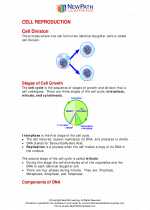 Cell Reproduction
Cell Reproduction  Activity Lesson
Activity Lesson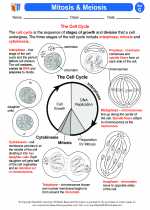 Mitosis & Meiosis
Mitosis & Meiosis  Worksheet/Answer key
Worksheet/Answer key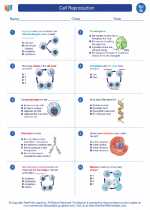 Cell Reproduction
Cell Reproduction  Worksheet/Answer key
Worksheet/Answer key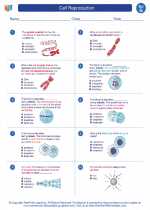 Cell Reproduction
Cell Reproduction  Worksheet/Answer key
Worksheet/Answer key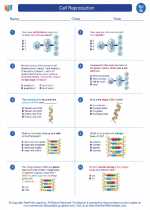 Cell Reproduction
Cell Reproduction  Vocabulary/Answer key
Vocabulary/Answer key Cell Reproduction
Cell Reproduction  Vocabulary/Answer key
Vocabulary/Answer key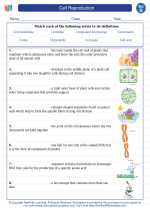 Cell Reproduction
Cell Reproduction  Vocabulary/Answer key
Vocabulary/Answer key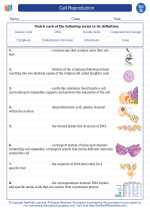 Cell Reproduction
Cell Reproduction  Vocabulary/Answer key
Vocabulary/Answer key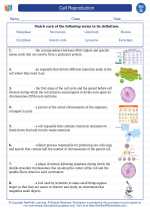 Cell Reproduction
Cell Reproduction  Vocabulary/Answer key
Vocabulary/Answer key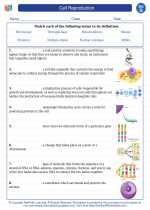 Cell Reproduction
Cell Reproduction  Vocabulary/Answer key
Vocabulary/Answer key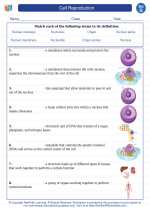 Cell Reproduction
Cell Reproduction  Vocabulary/Answer key
Vocabulary/Answer key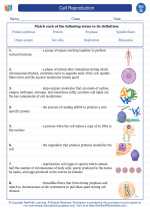 Cell Reproduction
Cell Reproduction  Vocabulary/Answer key
Vocabulary/Answer key Cell Reproduction
Cell Reproduction 

 Activity Lesson
Activity Lesson
 Worksheet/Answer key
Worksheet/Answer key
 Worksheet/Answer key
Worksheet/Answer key
 Worksheet/Answer key
Worksheet/Answer key
 Vocabulary/Answer key
Vocabulary/Answer key
 Vocabulary/Answer key
Vocabulary/Answer key
 Vocabulary/Answer key
Vocabulary/Answer key
 Vocabulary/Answer key
Vocabulary/Answer key
 Vocabulary/Answer key
Vocabulary/Answer key
 Vocabulary/Answer key
Vocabulary/Answer key
 Vocabulary/Answer key
Vocabulary/Answer key
 Vocabulary/Answer key
Vocabulary/Answer key

The resources above cover the following skills:
LIFE SCIENCE
From Molecules to Organisms: Structures and Processes
Gather and synthesize information to explain how prokaryotic and eukaryotic cells differ in structure and function, including the methods of asexual and sexual reproduction.